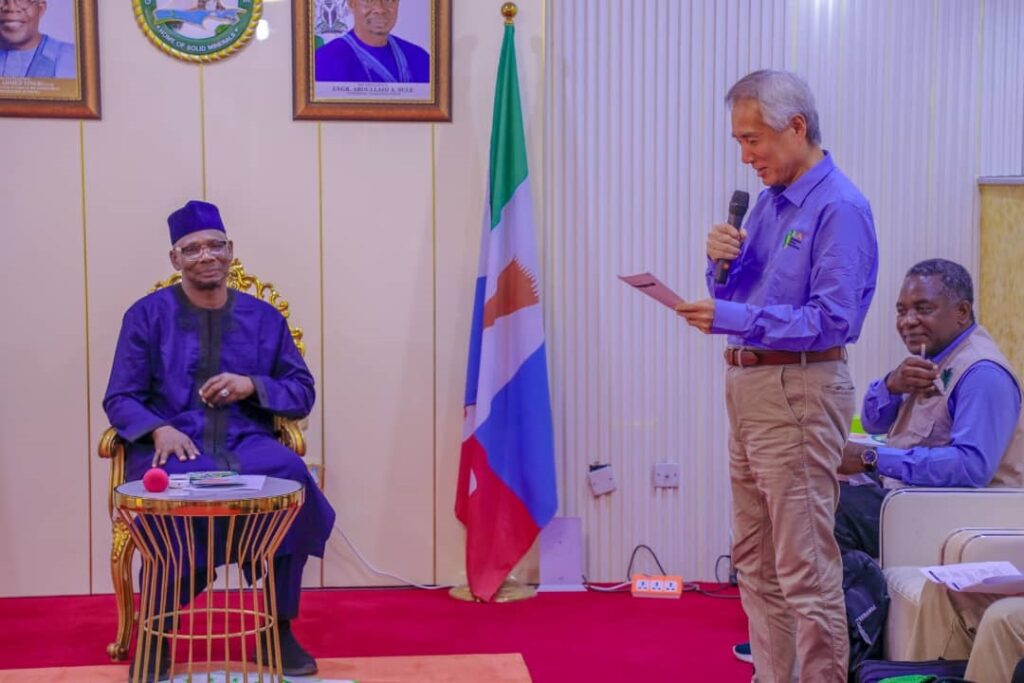The Sasakawa Africa Association (SAA) has received praise from Governor Abdullahi Sule of Nasarawa State for the initiatives aimed at developing the cassava and rice value chains in the state.
Grassroots Parrot reports that through funding support from the Japanese Ministry of Foreign Affairs, Sasakawa established two rice value chain development centers in Lafia and Obi local government areas of Nasarawa state.
The SAA also supported the establishment of over 200 hectares of cassava seed multiplication fields for improved varieties in the state.
The project tagged “Building an Economically Sustainable Integrated Cassava Seed System, Phase 2 (BASICS-II)” is being implemented in partnership with the International Institute of Tropical Agriculture (IITA).
However, the governor said the initiatives were strategically incentivizing his administration’s agricultural development agenda.
A statement issued by Moses Nongoatse, Communication Officer of Sasakawa Africa Association Nigeria, quoted the governor as giving the commendation on Wednesday when he received members of the SAA board and management in his office on a courtesy visit.
According to the governor, rice and cassava occupy vital positions in the state’s plan for food security, economic development, and energy, hence the appreciation of the SAA complementary role.
He revealed that the state had invested in the production of over 1700 hectares of rice and encouraged the production of cassava to meet the state’s industrial needs.
“The two value chains of rice and cassava you have been developing in our state are vital crops for us, and we are seeing great results.
“For example, we are currently harvesting the 1700 hectares of rice we produced, and the yield is improving. We’re getting three to five tons per hectare, but our target is 10 tons per hectare.
“I am sure that if we continue to work with Sasakawa, we’ll be able to increase the use of improved technologies and scale up yield and productivity.” He said.
The governor said he was aware that the cassava seed system project was successfully diffusing improved cassava varieties and quality planting materials in the state and making Nasarawa a source of quality cassava planting materials for farmers in the north-central region.
“The development is very important because it is strengthening our plan to place cassava at the forefront of our plan for food and energy, especially as it concerns ethanol production, for which we have industries working in the state.” He added.
Nasarawa State Governor Engr. Abdullahi A Sule in a group photo with the board and management of the Sasakawa Africa Association (SAA) during a courtesy visit at the Government House, Lafia
The SAA delegation, led by its president, Dr. Makoto Kitanaka, thanked Governor Sule for supporting Sasakawa’s efforts and promised that the organization would continue to support farmers in the state.’
In his remarks, the Country Director of the SAA Nigeria, Dr. Godwin Atser, acknowledged the governor’s role in the success of the rice value chain development centers in the state.
His words: “Your Excellency, I won’t forget that when we were embarking on that journey, you gave us some important advice, and it gave us speedy progress and hitch-free delivery. I am glad we took that advice and had your support all the way.”
Dr. Atser noted that apart from production, processing, and marketing, Sasakawa was introducing farmers to climate-smart agriculture through decarburization in rice and maize production, organic fertilizer production, as well as alternative energy production from rice husk.
Meanwhile, the SAA statement confirmed the signing of a renewal of a Memorandum of Understanding between the Sasakawa Africa Association (SAA) and the Nasarawa State Agricultural Development Program (NADP).
According to the statement, the MoU was aimed at strengthening agricultural extension services in the state, leveraging SAA’s expertise in technology dissemination and capacity building for extension staff.
It added that SAA and NADP have also been in partnership to provide extension staff with the necessary training and resources to promote innovative crop productivity enhancement technologies to increase food production and food security in the state.
